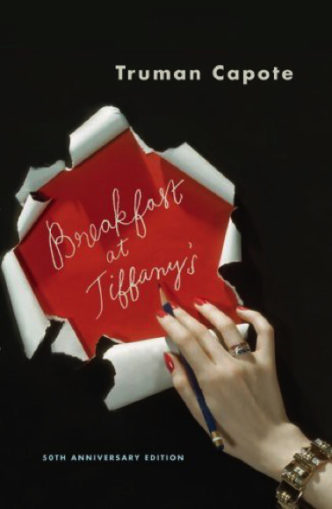
Truman Capote: Breakfast at Tiffany’s,
Wolf Gang – Licence CC BY-SA 2.0
Blake Edwards’ 1961 film Breakfast at Tiffany’s — loosely based on Truman Capote’s 1958 novella of the same name — was a showcase for Audrey Hepburn in her acting prime. (Ironically, Capote championed giving the part to Marilyn Monroe.) Although never a “great” actress in the traditional sense, Hepburn possessed charisma and screen presence, and this era was her time to shine. With Sabrina, Roman Holiday, War and Peace, and Funny Face behind her, and My Fair Lady still to come, Hepburn was an undeniable box office draw. Her gamine interpretation of Holly Golightly, a charming, flighty, feminine, but haunted young woman trying to create a life — is nearly perfect. And it isn’t just the countless costume changes (although style and elegance have always been Hepburn’s defining characteristics). Opposite Hepburn, playing struggling author Paul Varjak, is George Peppard. His star never ascended to the level of Hepburn’s (he is probably best remembered for the TV programmes: “Banacek” and “The A-Team”), but in this film he got to stand in the spotlight, at the peak of his Nordic-preppy good looks.
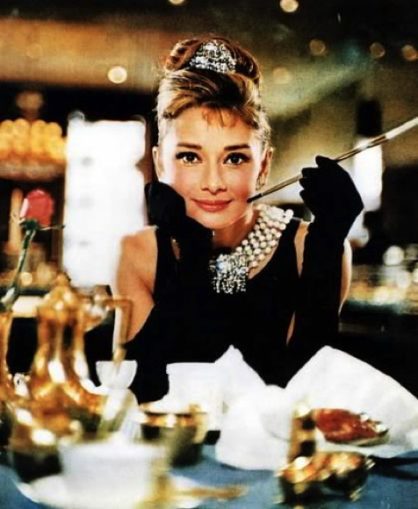
Audrey Hepburn smoking 7,
Nicholas R. Andrew – Licence CC PDM 1.0
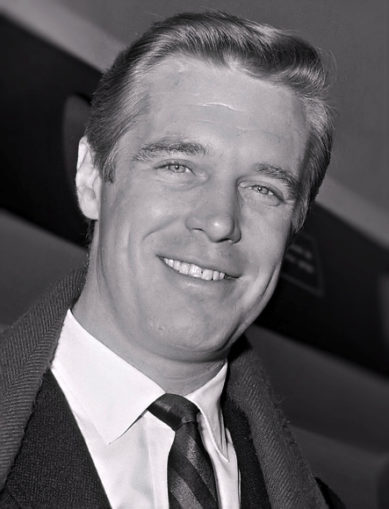
George Peppard (1964),
Jac. de Nijs / Anefo – Licence CC BY-SA 1.0
Now, if you had asked me what BaT was about, I would have said it is a wholesome romcom. But that’s not really true. It does have plenty of comic elements, but overall, BaT is a very sad and serious film. That’s certainly true of Capote’s novel, which is indeed so heartbreaking bleak that Blake Edwards rewrote the ending for the film to have us smiling as we watch the credits. And, as for wholesomeness, well it has that too in the end. But somehow we forget that BaT is the tale of the romantic misadventures of two gold-diggers, Holly Golightly and her upstairs neighbour, Paul Varjak, both of whom are skipping through their 20s by having sex with and taking money from older and richer people. Of course, they both maintain their self-respect by keeping a discreet distance between the sex-giving and money-taking, so that the quid pro quo is not too brazenly obvious. Capote said that Holly stopped short of simple prostitution, describing her as an “American geisha.” Both Holly and Paul rationalize their choices by reference to their goals. Holly wants to buy land and horses and care for her sweet but slow brother Fred, who is currently in the Army. (The novel is set in 1943.) Paul is a writer who needs a patron to give him time to work on his great novel. But it is not working. He’s got writer’s block, and as Holly acidly notes, he doesn’t even have a ribbon in his typewriter. Paul is the prouder and more serious of the two. Holly is the Olympic champion in the flake department, which, of course, means that Paul suffers greatly at Holly’s hands when he falls in love with her. But perhaps the false memories are really down to Henry Mancini’s music, which won two Oscars, and in particular the haunting classic “Moon River,” which casts nostalgia over the whole heartbreaking tale.
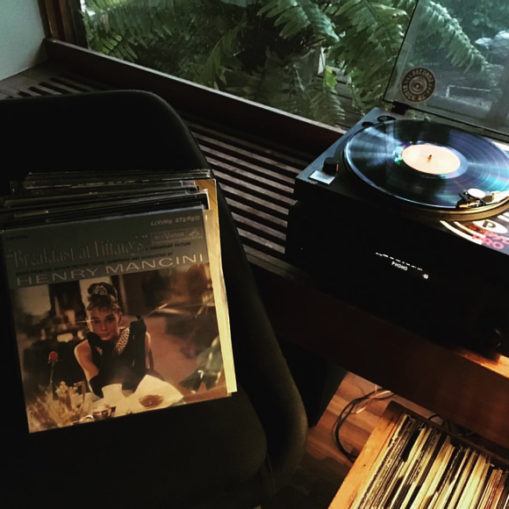
Cooking breakfast with Henry Mancini this AM #hantzhouse #vinyl,
Farther Along – Licence CC BY-SA 2.0
The basic plot of Breakfast at Tiffany’s is quite simple. Varjak/Peppard moves into an apartment on Manhattan’s upper east side and meets his ditzy downstairs neighbour, Golightly/Hepburn. She has lived there for a year but looks like she is still moving in. That’s because she’s rootless & a drifter. She has an orange cat, but she hasn’t given him a name, because she doesn’t want the commitment. Her favourite place in the world is Tiffany’s, the jewellers on Fifth Avenue. She declares to Paul that if she ever finds a place that makes her feel like Tiffany’s, she’ll put down roots and give the cat a name. Of course, it is hard to imagine a home that would feel like Tiffany’s. Trump Towers, perhaps?… Holly, in short, is not too practical. Her conditions for settling down are a fanciful way of saying “never.”
Paul’s apartment isn’t exactly “him” either. It looks like a suite in any Radisson hotel. It was decorated before his arrival by his “patron”, Mrs Failenson, nicknamed “2E,” played by Patricia Neal. The film created the character of Paul from the novel’s unnamed narrator. 2E and her relationship with Paul are inventions of the screenwriter, which considerably deepens the character and his relationship with Holly, creating dramatic conflict through “irreconcilable similarities.” Holly finds Paul to be a sympathetic, useful, and highly presentable neighbour. As fellow gold-diggers, they also have a certain understanding. But in her eyes, their shared mode of life also precludes a relationship, for Paul has no gold, and Holly has set her sights on older, uglier men with more money. For Paul, gold-digging is a short-term strategy, to get his start in life, at which time he will settle down with a nice girl and take care of her. For Holly, however, gold-digging is a long-term strategy to find a husband, who will take care of her forever.
One of the most captivating sequences in BaT is when a mysterious stalker shows up outside Paul and Holly’s building. 2E thinks her husband is having her followed. Paul is up for confrontation and after a game of cat and mouse in the east side and in Central Park, the stalker approaches Paul and says, “Son, I need a friend.” It turns out that the stalker, played by Buddy Ebsen, is Doc Golightly, a veterinarian from Texas and Holly’s . . . no, not her father, her husband, whom she married at the age of 14. Holly’s real name is Lula Mae Barnes. Lula Mae and Fred were runaways who showed up on Doc’s farm. Doc was a widower who needed a “helpmeet”. Hence the marriage. Doc has tracked Lula Mae down to persuade her to return home to “her husband and her chirren.” Holly will have none of it. The marriage was annulled long ago, and she’s just not Lula Mae anymore. She has constructed a whole new identity for herself. She got rid of her hick accent with French lessons, courtesy of a Hollywood producer, O. J. Berman (Martin Balsam), and she has a fabulous circle of rich male friends—whom she rates as “rats” and “super-rats”—competing for her attention. When she sees a heartbroken Doc off at the Greyhound Bus station, she tells him that she’s a “wild thing” and that one should never fall in love with wild things, because they will just break your heart. In truth, Holly doesn’t know who she is or what she wants and is afraid of real relationships and real commitments. Berman thinks Holly is a phoney, but he debates whether she is a real phoney or not—a real phoney being someone who believes his own nonsense. The whole sequence moves from creepy, to comical, to corny, to deeply moving. That’s the true genius of this film.
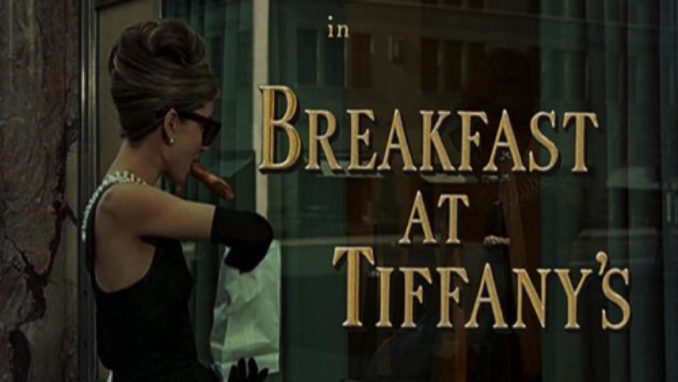
Breakfast at Tiffany’s (1961),
Susanlenox – Licence CC PDM 1.0
Once Doc has been sent on his way, Holly gets roaring drunk. It is a catharsis, a crisis, a crossroads. Paul now knows her story but loves her all the more. He hopes that she will get a little more serious about life, and maybe about him. Paul enjoys taking care of Holly. It makes him feel strong, manly, & useful, whereas being taken care of by 2E is convenient but emasculating. Unsurprisingly, Holly proves to be the better muse than 2E. Awakening Paul’s inner man also awakens his creativity. Thus Paul is appalled when Holly declares that she is no longer going to play the field. She is going to set her sights on marrying Rusty Trawler, the ninth richest man in America under fifty, despite or on account that he’s a simpering manlet. (In the book ,Trawler is a Nazi sympathizer who once proposed marriage to Unity Mitford.) When Trawler falls into the clutches of another gold-digger, Holly coolly switches to pursuing José da Silva Pereira (played by José Luis de Vilallonga, a real-life Spanish aristo), the dashing but strait-laced Brazilian from a prominent family. It is not clear to Paul, though, if he means to marry her or merely keep her as a mistress. Whatever José’s intentions, however, he calls it off when Holly is arrested. Holly has been receiving $100 per week to visit Sally Tomato, an elderly mobster incarcerated at Sing Sing, and deliver his “weather report”—obviously coded messages about the narcotics trade—to his people outside. Berman gets Holly bailed out, Paul packs her belongings and the cat, and picks her up at a police station to take her to a hotel where she can hide out from the press. In the cab, he breaks the bad news about José. While adjusting her lipstick, Holly coolly decides to jump bail, use her ticket to Brazil, and marry some other rich South American. In an act of consummate bitchery, she tells the cab to pull over and abandons the cat in an alleyway in a downpour. In the novella, she follows through with her plan and disappears. In the film, Paul gives Holly a powerful talking to. He tells her that people really do belong to one another and that it is the only real chance we have of happiness. Of course, Paul actually changes Holly’s mind. She runs into the rain, searching for the cat, whom she finds, then Paul and Holly embrace, the prototype of a human family that may come to be. (Holly definitely wants children.) The end — a happy one, we hope.
Unsurprisingly, the Woken SS don’t like BaT very much. The behaviour & attitudes depicted are consistent with traditional male & female genders & assume this is the norm. It is also very obviously anti-feminist, and therefore “problematic.” Perhaps fortunately, most of their anger is directed at the portrayal by Mickey Rooney of Holly’s upstairs neighbour, Mr Yunioshi, as a caricatured buck-toothed Jap, straight out of World War II propaganda cartoons. Capote’s novella makes much more of race – when Holly notes that José has a touch of black blood, she doesn’t mind the prospect of having slightly “coony” babies as long as the father is rich and respected. (In spite of his get-out-of-jail-free-gay-card, eventually, they’ll surely come for Capote as well.)
I highly recommend Breakfast at Tiffany’s. Some will say I’ve revealed too much about the plot, but what is most enchanting about this film can’t be captured in the script. It simply must be seen — for the beautiful people, the iconic fashions, Hepburn shimmering, Mancini’s strings soaring, and the shots of a 1960s New York that never was, providing an indelible fairy tale landscape. Its romanticism is saved from sentimentality by its zaniness and, conversely, its zaniness is saved from obscurity by its romanticism. In one scene, Hepburn sits on a window ledge in a loose-fitting jumper and slacks, bandanna tied lazily around her head, and croons Moon River on an acoustic guitar while Peppard secretly watches her from a higher window. The song is a bittersweet ode to unfulfilled dreams, the way love should be, could be…….. As it ends, she peers down, lost in some private reverie of sadness, & strings play on in the background. She glances up at Peppard and, surprised to see him, flashes a wide smile. This is what people mean when they talk about “movie magic”. Watch it as nostalgic, escapist entertainment — a mid-century American time capsule – it superbly communicates the joys and follies of youth when at its peak — an age of seemingly infinite potential — and the necessity of finally growing up and actually taking a stand, of actually becoming someone.
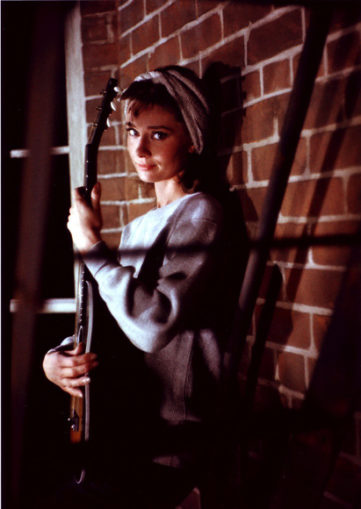
Audrey Hepburn Playing Guitar in Breakfast at Tiffany’s,
Fred Baby – Licence CC BY-SA 2.0
© DJM 2021
The Goodnight Vienna Audio file



